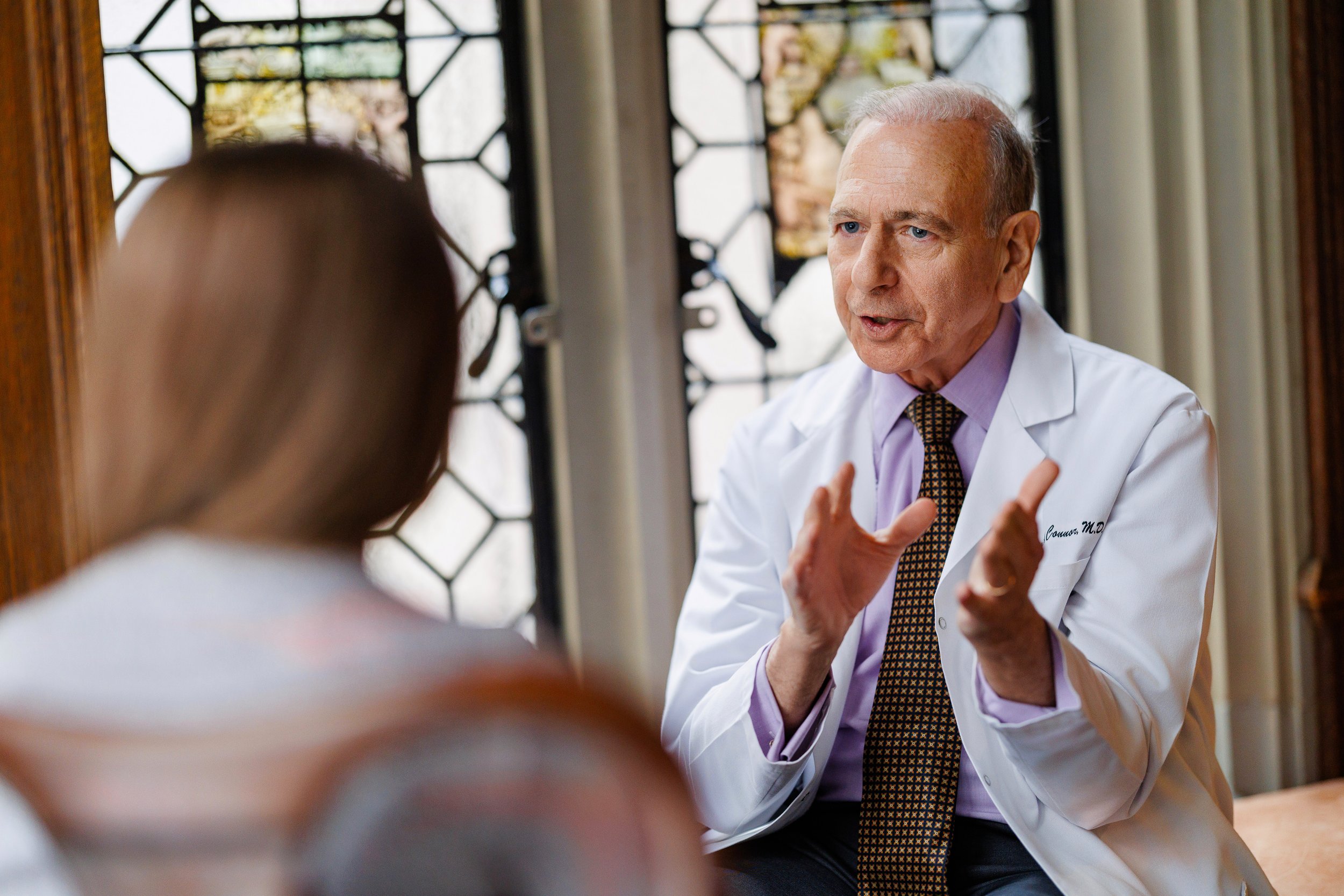Bradley A. Connor, M.D.
110 E 55th Street, Floor 16
New York, NY 10022
Gastroenterology, Infectious Disease, Travel & Tropical Medicine

Leading the Way in Medical Excellence
Our Clinic & Team
Amid the towering skyline of Manhattan’s Midtown East, our clinic provides expert care in infectious disease, gastroenterology, and a variety of multi-system disorders. Led by the world-renowned physician Dr. Bradley A. Connor and under the Clinical Direction of Marina Rogova, a board certified Family Nurse Practitioner, our clinical team specializes in diagnosing and managing complex gastrointestinal illnesses and tropical infections, offering the most advanced testing and treatments. With a patient-centered approach, we deliver precise, discreet, and dedicated medical attention to each of our patients.
Dr. Bradley A. Connor
Clinical Professor of Medicine & Attending Physician
Serving patients in Manhattan, across the U.S., and internationally, Dr. Connor provides expert care in gastroenterology and tropical medicine from a state-of-the-art facility in Midtown East. A world-renowned specialist, Dr. Connor focuses on chronic gastrointestinal disorders in returned travelers, gastrointestinal infectious diseases—including parasitic infections—and emerging infectious diseases. He is a sought-after consultant for complex diagnostic cases and serves as a second-opinion specialist for Fortune 500 companies, the White House Medical Unit (WHMU), and the Centers for Disease Control and Prevention (CDC).
Marina Rogova, N.P.
Family Nurse Practitioner & Clinical Director
Marina Rogova has led the practice since 2017 and is Medical Coordinator of Travel Health Medical, PC, a WHO-certified Travel Medicine Clinic. She co-directs the Infectious Disease Laboratory and helped oversee a COVID-19 PCR testing program that conducted over 25,000 tests. A member of the International Society of Travel Medicine (ISTM), she holds a Certificate in Travel Health (CTH) and co-directs the New York City site for GeoSentinel. Committed to providing expert, compassionate care, Marina ensures each patient receives the highest standard of medical attention.
We specialize in diagnosing and managing a wide range of gastrointestinal conditions, including disorders of the upper gastrointestinal tract such as reflux (GERD), Barrett’s esophagus, eosinophilic esophagitis, and swallowing difficulties. We also treat stomach ulcers, Helicobacter pylori infections, and cyclic vomiting syndrome, as well as celiac disease, small intestinal bacterial overgrowth (SIBO), gut microbiome disorders, inflammatory bowel disease, and irritable bowel syndrome (IBS), including post-infectious IBS (PI-IBS). Our practice has unique expertise in diagnosing and treating intestinal infections and post-travel diseases such as malaria, leptospirosis, leishmaniasis, and typhoid fever, among others.
Clinic services
In-House Laboratory
Our physician-office laboratory is CLIA-certified, meeting the standards of hospital and commercial laboratories. We provide same day test results, often within just a few hours of sample collection.
For our patients or for patients with a referral from another provider, we are able to run stool samples on the BioFire FilmArray GI Panel, which tests for 22 of the most common gastrointestinal pathogens causing diarrhea and stomach distress.
Our in-office diagnostic PCR laboratory is the only place in New York to provide same day results for gastrointestinal and respiratory specimens, with results available often within hours.
Endoscopic Procedures
An endoscopic procedure is an outpatient procedure during which a thin flexible tube (colonoscope or gastroscope) is used to view the inside of your gastrointestinal tract. Endoscopic procedures include colonoscopy, flexible sigmoidoscopy, and upper gastrointestinal endoscopy or esophago-gastro-duodenoscopy (EGD).
House Calls
We are available to make house calls if you are unable to leave your home for any reason. For your convenience we can provide certain services at your home, hotel, or place of business.
Gastroenterology infectious disease travel medicine
Gastroenterology infectious disease travel medicine

Our Affiliations
-

White House Medical Unit
-

New York Presbyterian
-

Weill Cornell Medicine
-

Physicians For Human Rights
-

American Society for Gastrointestinal Endoscopy
-

American College of Gastroenterology
-

International Society of Travel Medicine
-

American Gastroentological Association
-

American Society of Tropical Medicine & Hygiene
-

GeoSentinel Foundation
Awards & Recognition
-

"Best Doctors” New York Magazine
-

Castle Connolly Best Doctors USA
-

Fellow of the Royal College of Physicians and Surgeons (Glasgow), FFTM, FRCPS
-

Becker’s ASC Review – “Gastroenterologists to Know”
-

Super Doctors
-

Excellence in Surveillance and Health Monitoring, National Center for Emerging and Zoonotic Infectious Diseases (NCEZID), Centers for Disease Control and Prevention (CDC)
-

Fellowship, American College of Physicians (FACP)
-

Fellowship, Infectious Diseases Society of America (FIDSA)
-

Fellowship, American Gastroenterological Association (AGA-F)
Expertise and dedication
35+ years of
Clinical Experience
Frequently asked questions
-
We accept over 200 in-network insurance plans including Aetna, BlueCross BlueShield, and Cigna. For specific coverage details, please contact our office. We also offer direct payment options, including credit cards, debit cards, and ACH wire transfer.
-
We specialize in gastroenterology, infectious disease, and travel medicine, offering endoscopic procedures (colonoscopy, EGD), in-house lab testing, post-travel evaluations, and primary care services. We provide travel vaccinations, house calls in Manhattan, and international referrals for patients needing care abroad. Our expertise also includes tropical dermatology and same-day diagnostics for gastrointestinal and respiratory illnesses. For a full list of services, visit our Services Page.
-
Appointments can be scheduled online through our patient portal or by calling our office directly. We offer both in-person consultations and telemedicine appointments.
-
Please bring a valid ID, insurance information (if applicable), a list of current medications, and any relevant medical records or test results. If you are seeing us for travel medicine, bring your itinerary for personalized recommendations.
Feel free to reach out with any questions.
-
110 E 55th Street, Floor 16
New York, NY 10022 -
-

“My number one priority is always the patient. I do whatever it takes to make sure they receive the best possible care.”
— Bradley A. Connor, M.D.





